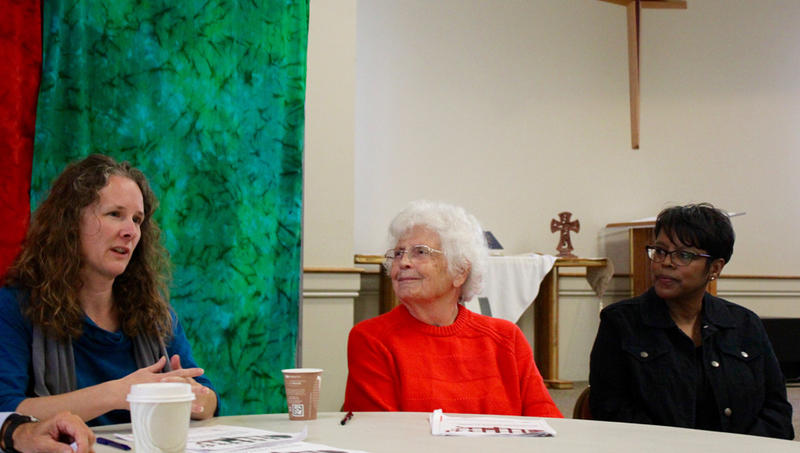October 28, 2016. kcur.org
As communities across Kansas struggle to accommodate an influx of people with mental illness in their criminal justice systems, religious leaders are calling for a new approach in Lawrence.
A group called Justice Matters, which represents 23 congregations, released a report this week called “Restorative Justice at Home.” The report contains several recommendations to beef up Douglas County’s mental health treatment options as an alternative to a proposed expansion of the county jail.
At a news conference Thursday, members of the group described the report as comprehensive reform that aims to shift the community from thinking about mental illness as a risk factor for criminal behavior to thinking about it as a medical condition like heart disease or cancer.
“We’re in a culture where we’re so tied in to incarceration and handling that and saying that’s the way to keep people safe, rather than looking at (causes of incarceration) up front,” said Kathy Williams, a pastor at First United Methodist Church, which hosted Thursday’s gathering.
The group, she said, hopes to create “a culture where we can talk about mental illness in our churches and communities and … guide people to the resources. So it really is just changing our mindset.”
Joanna Harader, a pastor at Peace Mennonite Church, said members of Justice Matters acknowledge that the county jail is overcrowded and “the current status quo is not sustainable.”
But Harader said the group wants the County Commission to explore the reasons for increased incarcerations before moving forward with a proposed $30 million jail expansion — especially given that violent crimes and property crimes are both down substantially over the past decade, according to Kansas Bureau of Investigation statistics.
Justice Matters member Barbara Palmer said some of the jail overcrowding can be attributed to mental health issues and something that often goes hand-in-hand with them: using illegal substances.
“The overwhelming problem is drug abuse,” Palmer said.
The Justice Matters report identifies several U.S. counties that were able to reduce their jail populations by incorporating diversion and treatment programs.
Harader said the Lawrence Police Department already has taken one critical step by requiring all officers to take crisis intervention team training, a program that teaches officers how to de-escalate encounters with people who have mental health problems.
But Justice Matters members said the county lacks options for officers once they recognize someone needs mental health help.
Some people who have mental health breakdowns are arrested for minor infractions related to their conditions.
“We have people that are incarcerated that don’t need to be incarcerated and are actually being harmed by being incarcerated,” said Rose Schmidt.
Others are taken to hospital emergency rooms. Harader pointed to the case of a man with bipolar disorder who was recently sentenced to two days in jail after assaulting an emergency room nurse at Lawrence Memorial Hospital.
“He should not have had to go to the ER in the first place,” Harader said. “We need a crisis center.”
The Justice Matters report points to Rainbow Services Inc. in Wyandotte County as the model for such a center.
The report says Douglas County also needs a mental health court like Wichita’s and a diversion program like Johnson County’s in which people with mental illness can get criminal charges put on hold and ultimately dismissed if they complete treatment programs.
Harader said the group’s vision is for Douglas County to be the first place in Kansas to bring all of those elements together in a comprehensive system that other communities can copy.
The Justice Matters initiative comes at a time when local law enforcement and hospital officials say they’re bearing the brunt of a breakdown in the state’s mental health system.
The Legislature has cut aid to 26 community mental health centers throughout the state that became key providers following the closure of state mental hospitals.
Osawatomie State Hospital, one of two remaining state psychiatric facilities, has had beds reduced and federal funding pulled after inspectors observed conditions they considered unsafe for patients and staff.
The intended audience for the Justice Matters report is Douglas County policymakers, but Harader said state help also would be welcome.
“Having some flexibility to put programs in place that may seem a little more costly to begin with but will bear fruit as they’re in place can take some funding,” Harader said. “So that funding is definitely a way the state can help encourage and support these kinds of efforts within the counties.”
View original article.






